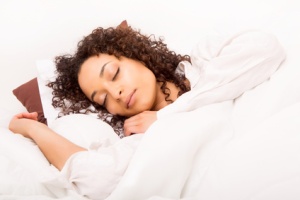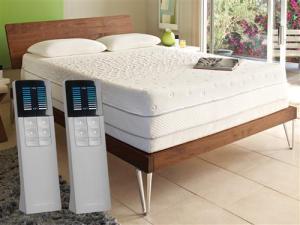5 Tips For Creating The Perfect Sleep Environment
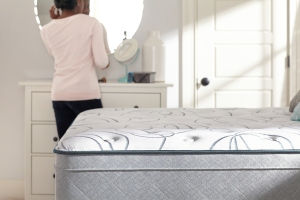 The conditions in your bedroom that promote sleep can have a huge impact on how refreshed you wake up each day. Many people give little thought to their sleep environment unless they encounter trouble sleeping but everyone could benefit from upgrading their bedrooms to encourage a good night’s sleep.
The conditions in your bedroom that promote sleep can have a huge impact on how refreshed you wake up each day. Many people give little thought to their sleep environment unless they encounter trouble sleeping but everyone could benefit from upgrading their bedrooms to encourage a good night’s sleep.
- Eliminate Distractions
Trying to sleep in a cluttered room can cause feelings of anxiety that could prevent quality sleep. You don’t need a reminder of all the things on your to-do list as you try to fall asleep at night. Speaking of distractions, it may also be beneficial to remove computers, TV’s and other electronic devises from your bedroom sanctuary as well.
- Create The Right Noise
Even the quietest noise can keep you from sleeping; such as a leaking faucet, music playing in another room or the neighbor’s barking dog. But sleeping in complete silence might not be the answer either. Studies have shown that an absence of familiar noise might also make sleep difficult. That’s one of the reasons we have trouble sleeping away from home. Add “white noise” like the sound of a fan running to block annoying sounds and create a soothing sound to sleep to.
- Balance The Temperature
It is thought that temperatures above 75 and below 54 Fahrenheit can keep you from sleeping comfortably. Make sure to balance the temperature in your bedroom and encourage good airflow. Most people find they sleep best at temperatures below 70 degrees.
- Know Your Bed
An uncomfortable bed, a lumpy mattress or a squeaky bed frame can make it hard to fall asleep and make sure you wake up feeling every ache and pain. You should change your mattress around every 8 years or so, have comfortable sheets and a strong frame.
- Adjust The Lighting
Light from a flickering TV set, filtering in from another room or streaming in from your window too early in the morning can be a real sleep-buster. Turn off the TV or other devices giving off too much light and invest in some room darkening shades to keep your room darker longer in the morning. Even the light from clocks has been show to affect sleep!
The Bedding Experts has been helping clients to find the perfect mattress since 1983! For expert advice, in a relaxed shopping environment, please call 888-943-3447 or visit The Bedding Experts Store Locator. Thank you and have a nice day!
5 Signs You Might Be Due For A New Mattress
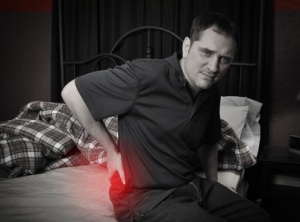 It is easy to tell when it’s time to replace your air conditioner because it no longer blows out cold air, but how do you know when it’s time to get a new mattress? Your old mattress doesn’t simply stop working, so how can you be sure?
It is easy to tell when it’s time to replace your air conditioner because it no longer blows out cold air, but how do you know when it’s time to get a new mattress? Your old mattress doesn’t simply stop working, so how can you be sure?
The longevity of your mattress is dependent upon the mattress type, frequency of usage, climatic conditions and a variety of other factors. Since you can’t rely on time alone, here are five signs to look out for that could help you determine if a new mattress is needed.
1. You wake up with new aches and pains each morning
A mattress that is past its expiration date will be uncomfortable to sleep on, and you may find yourself waking up feeling stiff, achy or even numb. If you wake up each morning with increased back and neck pain then it might be time for a new mattress.
2. You can get a better night’s sleep anywhere other than your bed
If you find yourself heading to the couch to get a good night’s sleep or wake up from a trip away from home incredibly refreshed then this too could be a sign that your own mattress is shot. You should sleep best in your own bed. If you don’t, it might be time for a new one!
3. Your mattress is visibly worn out
A truly worn out mattress might have a large dip in the middle, be discolored or even have exposed springs or worn material. If your mattress is looking like it’s been handed down through the generations, you might be in need of a shopping trip!
4. You can’t stop sneezing at night
Mattresses collect dust and allergens over time. If your mattress is getting old you might find yourself coughing and sneezing throughout the night, thereby limiting your restful sleep. Anyone with asthma problems might need a new mattress more frequently than other people.
5. Your mattress is over 7 years old
While there is no set expiration date for your mattress, many only last around seven years. If your mattress is beyond seven years old and you are also experiencing one or more of the other signals listed above, then you should probably get a replacement soon.
If you are in the market for a new mattress and need additional assistance to purchase one, please don’t hesitate to contact the experts at Bedding Experts. We’d be more than happy to pair you with a mattress that will restore your good night’s sleep!
5 Reasons You Absolutely Need a Good Night’s Sleep
If you see yourself as a night owl or are so busy that you often stay up late working on your to-do list, you might be surprised at just now damaging lack of sleep can be to your brain and your body. Your body needs to rest and reset each night, and eight hours of uninterrupted sleep just can’t be beaten.
Here are our top five reasons you should be getting more sleep:
Reduce Stress and Improve Your Mood
Your body really needs 7-9 hours of sleep per night, and if we lack quality sleep for a period of time it can actually change your personality. A lack of sleep can cause anxiety, irritability, mood swings and even feelings of aggression. Hitting the pillow a little earlier each night can help you relax and avoid health related problems associated with stress and anxiety. The improvement in your usual grumpy sleep-deprived mood can also reflect positively on your relationships as well.
Avoid Obesity or Aid Weight Loss
Many experts have linked poor sleep to obesity. Although the jury is still out on exactly why this is, many doctors and scientists have suggested that it has to do with the way sleep interruptions change your appetite and metabolism.
Improve Memory and Learn Faster
Being tired is bad for your short-term memory and makes it difficult to concentrate. People with poor sleep habits report feeling “foggy” and often forgetting names, dates or other information. Improving your concentration will also help you learn new information and retain it faster, improving your school and work performance.
Boost Immunity and be Healthier Overall
Getting enough sleep will help strengthen your immune system, leading to less sick days and more productivity! Additionally, by reducing your stress with a good night’s sleep, you will also avoid health issues like heart disease and high blood pressure.
Reduce Chronic Pain and Inflammation
In addition to getting less colds and lowering your blood pressure, sleep can also help you heal faster from injury and reduce pain-causing inflammation. Making sure to get a minimum of seven hours of sleep each night can lead to a more comfortable and more productive life!
Quality mattresses help thousands of our clients sleep better every day. Browse Our Mattresses Online today.
5 Tips to Sleep Better While Pregnant
Along with joy and anticipation, the physical and hormonal changes of pregnancy can bring stress and sleepless nights for many women. No matter what stage of pregnancy you are in, there are sleep obstacles to overcome. Everyone, and every pregnancy, is different, but there are some sleep tips that seem to do the trick for most people.
The most common sleep obstacles for pregnant women are:
-
Frequent trips to the bathroom throughout the night
-
Physical and Emotional stress
-
Heartburn
-
Leg cramps & soreness
-
Back pain
-
Discomfort of growing belly
If you are having trouble falling asleep or staying asleep then this lack of sleep will start to takes its toll with each passing day, leaving you exhausted. This isn’t good for you or your growing baby. Therefore, it will become important to find some ways to make sure you get enough peaceful sleep. Here are a five tips to help you get started:
-
To combat the middle of the night trips to the bathroom, make sure to hydrate earlier in the day as much as possible and avoid drinking too much a few hours before bedtime. As your baby grows larger, however, one or two midnight bathroom breaks might become unavoidable.
-
Tame heartburn by cutting out spicy and acidic foods as much as possible. Stay hydrated and eat at least 1-2 hours before you lay down. Towards the end of your pregnancy, you might want to sleep slightly elevated. An adjustable bed is ideal for this and may also help with elevating sore feet/legs, but pillows do the trick. Some women even sleep in a recliner to get the right elevation, especially if heartburn is at its worst.
-
Take the time to set up and follow a nightly routine that helps relax your body and mind before going to bed. You could include soft music, aromatherapy, lotion, warm baths or anything else you find soothing. Just think about what helps you relax and talk about it with your partner and family, then make it a habit!
-
Some people find that exercise relieves stress and helps them sleep better at night. Follow your doctor’s orders on what are the best exercises for you during each stage of your pregnancy. Try to avoid exercising right before bed however, as this may keep you up also.
-
While pregnant, the optimal sleep position is to lie on your left side. This helps blood flow, and many pregnant women find it very comfortable. Support your head and neck with a lot of pillows to help you breathe better and keep heartburn at bay. Support your legs, back and belly with a body pillow. A great pillow to use is the Tempur-Pedic body pillow which custom forms itself to your body during use.
If you still find it difficult to get enough rest at night, try taking a short nap (30 min.) during the day. Soon enough your baby will be here, and sleeping will become a luxury! Enjoy this time and get plenty of sleep.
If you suffer from chronic back or neck pain, you know just how difficult it is to get a good night’s sleep. Being in pain, in general, is enough to keep you awake, but back and neck pain can be especially difficult to sleep with. Your sleep position, pillows and mattress type can all have an impact on how well you sleep and how rested you feel upon awakening. If you’ve tried everything else, including seeking help from a physician, to alleviate your back and neck pain, it might be time to try a new mattress.
Are firmer mattresses better for back pain?
The short answer is no. If a hard mattress is uncomfortable, then it’s generally not relaxing the muscle of our back and provide the necessary support. Many people wrongly believe that “extra firm mattresses” are the best mattress choices for chronic back pain. There is even an old wives tale that suggests sleeping flat on the floor is best for men with bad backs. In reality, an extra firm mattress is too firm for the average sleeper and may cause circulation issues and not properly support the curves of the human body in different sleep positions. Generally, a medium firmness is best to provide comfort and support to the curve of the human body in all of the positions we sleep in. Also, extra soft mattresses may cause a hammock affect, bowing instead of providing a neutral position to sleep in.
If someone is exclusively a back or stomach sleeper and like a hard mattress, then an extra firm mattress may be best. If someone is exclusively a fetal position sleeper and loves the extra soft feel, then an extra soft pillowtop mattress may be best. Otherwise, choose one with an in-between feel!
Have any scientific studies shown a mattress that is best for back pain?
Not exactly. The only company that has completed large-scale, scientific studies about their mattresses is Tempur-Pedic. Tempur-Pedic mattresses & adjustable beds have been shown to have a very high owner satisfaction rating. 94% of owners say they’re satisfied over-all with their Tempur-Pedic mattress (Blackstone 2011) and when compared to other companies it is very high indeed. Additionally, Tempur-Pedic mattresses include a trial period to test the mattress at The Bedding Experts. Other companies make ridiculous, unbelievable statements about their products solving back problems, none of which are backed by a real scientific study. Sleep Number, for example, claims that ‘93% experience back pain relief.’ This claim, used today in Sleep Number advertising, is based on a 1996 study of 30 individuals who were provided a Sleep Number adjustable bed to replace their coil mattress. The researchers reported “that most patients with chronic non-specific back pain will have improved sleep on the [Select Comfort] adjustable bed.” The Sleep Number Beds claims are misleading in the least. So, is there a scientific study that shows a mattress is the best for helping back pain? No, but some mattresses help people sleep better overall, including those with back pain. It’s about finding the one that is comfortable for you that provides pressure relief, support, and is durable.
What mattress types does Bedding Experts recommend for people with back pain?
Firstly, we recommend consulting with a physician about any back related issues before thinking that a mattress will solve your back problems. The mostly highly recommend bed in America though is…you guessed it: Tempur-Pedic. In general, we recommend pressure-relieving mattresses that support a neutral sleeping position.
-
Tempur-Pedic: Tempur-Pedic mattresses are the most popular mattresses in the world and have a very high consumer satisfaction rating. Not only do the statistics back up Tempur-Pedic’s claims, but in our personal experience we have had a lot of happy customers that were overjoyed with their Tempur-Pedic mattresses helping their back issues. Tempur-Pedic is also the mostly highly recommend bed in America.
-
Memory Foam: Memory foam is a very similar material to TEMPUR foam and is popular because it conforms to the shape of your body, providing comfort and support throughout the night. The Bedding Experts offers some of the best memory foam brands available today and we often recommend this memory foam mattresses if someone is interested in a pressure-relieving mattress, but don’t like the unique TEMPUR feel.
- Hybrid Mattresses: For our clients that don’t want to make the leap to an all-foam product and like the support structure and feel of a solid innerspring, but still want the pressure-relieving qualities of memory foam, we recommend a hybrid style Beautyrest or Posturepedic mattress. These products feature a supportive coil system below a comfortable layer of pressure-relieving memory foam.
Proper Alignment for a Better Sleep and a Better Back
Besides mattresses that offer a relaxing sleep surface for your back muscles to relax and your posture to be neutral, there are other options that really help with great sleeping posture.
Pillows – A pillow that is the right size is the most important. Choosing a pillow really takes two to determine correctly. Have the other person make sure your neck is straight while the curve feel supported. A pillow that is too thick or too thin can put pressure on neck and lower back. We also offer pillow fitting at our Chicago Mattress Stores.
Adjustable beds – an adjustable bed can elevate your torso or feet to get the best possible sleeping position, thus reducing strain on your lower back and other parts of your body! This can also be a wonderful product to rest your feet and may be beneficial for those with sleep apnea, chronic heart burn, inflammatory conditions, and other ailments that may benefit from elevation of the legs or torso.
Positional Pillows & Accessories – Other options include a knee pillows, wedges, body pillows, and other specialty sleep products that aid in proper sleep posture.
Combine your new mattress, pillows, and sleep position products with good bedtime routine for the best results in alleviating back & neck pain!
If you need additional assistance to purchase a mattress that helps mitigate your back and neck pain, please don’t hesitate to contact the experts at Bedding Experts. We’d be more than happy to pair you up with a mattress that befits your special needs. 888-EXPERTS (397-3787)
Will You Sleep Better On A Tempur-Pedic Bed?
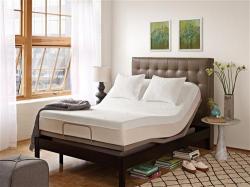
If you wake up with aches and pains, or have trouble sleeping comfortably through the night, someone may have recommended a memory foam mattress or mattress topper to ease your pain. One of the most recognized brands in memory foam technology is Tempur-Pedic. Their product can be slightly more expensive though and you may be wondering, is it worth it?
Tempur is a material originally designed by NASA to use in airplane seats, specifically made to help support a person and absorb shock during a crash landing. Since then, it has been used to make pillows and mattress that better support the body during sleep by a company headquartered in Lexington, KY.
Tossing and turning is caused by pressure points, areas where your body is resting heavily against the mattress. A Tempur-Pedic bed reduces pressure points which allows you to rest through the night without all the shifting around. Another benefit to this shock absorbing material is that when your partner gets in and out of bed you are less likely to feel the movement and wake up. If you have a partner that goes to bed later than you or has a tendency to get up in the middle of the night, this type of mattress can really help you stay asleep and get more rest.
Sleeping on memory foam can help support the head, neck, hips and spine, making for a more comfortable night’s sleep. Much of the price consideration for memory foam is based on denseness, and Tempur-Pedic is one of the highest quality mattresses on the market today. Its’ ability to last longer and provide more support justifies the slightly higher prices. An enduring and comfortable product is certainly worth more money, considering that a restful night’s sleep is just about priceless.
Most Tempur-Pedic users give the mattress rave reviews, the one con that is sometimes mentioned is that the mattress can have the tendency to absorb heat and be a little warmer throughout the night. When testing the mattress in the store some people worry that it will be too firm, but keep in mind that Tempur-Pedic’s patented material is meant to conform to your body over time. Tempur-Pedic mattresses are heat-sensitive and soften as you lay down, thus conforming to your body and removing any points of pressure.
Even if you are not in the market for a new mattress at this time, you can benefit from the comfort of memory foam by using a mattress topper or pillow. Tempur-Pedic makes both of these products as well as their mattresses, all with the same high quality materials.
See the experts at Bedding Experts for more information about Tempur-Pedic and other memory foam mattresses, and get help picking out the perfect mattress for your personal needs. We also offer a 90 day trial for Tempur-Pedic, just in case the product doesn’t match your comfort preferences.
Top 3 Mattress Myths

Almost all human beings on the planet have one goal in common – a good night’s sleep! Many factors can affect your sleep, such as stress levels, comfort levels, temperature etc. Having the right mattress greatly increases your odds of having a restful evening and waking up refreshed. There is a lot of misinformation and old wives tales out there that might stand in your way of making the best choice.
We’ve rounded up the top three mattress myths to help you figure out where to start.
1. Bad Backs Require Firm Mattresses
People with chronic back pain are on a never ending quest for a great night’s sleep. A good deep sleep requires comfort and it is difficult to find comfort when you suffer from back pain. Many people mistakenly think that soft unsupportive mattresses are to blame for some back pain, and everyone just wants to know which mattress will give them the best shot a restful night.
Independent studies done in Ireland tested how well people slept on different types of mattresses. The results showed that both extremes, hard or soft mattresses, caused an equal amount of uneasy sleep patterns. The medium mattresses got the highest ratings from those suffering from back pain. The best results came from Tempur Pedic mattresses which are made of foam and designed to fit around your body.
2. Replace Your Mattress As Soon As It Becomes Uncomfortable
Your mattress should last you between 5-7 years. If you suddenly don’t feel as cozy in your newer mattress there could be a variety of reasons that have nothing to do with the remaining life of the mattress. You can purchase a variety of mattress accessories from your mattress store that you can place over your existing mattress to get a new feel. There are toppers that are filled with memory foam or even a special gel that will help conform to your unique shape and help you get a better more peaceful night’s sleep. Using this method you can double the life of your mattress and be more comfortable at the same time!
3. The More Expensive The Mattress, The Better You’ll Sleep
Not only will overpaying for your mattress not guarantee you a better night’s sleep, but the extra strain on your budget might keep you tossing and turning all night. The most important factor in your new mattress is personal comfort. Decide your budget before going mattress shopping. While you’re at it, take note of what position you sleep in most and take stock of any physical issues, like back or neck pain. Believe it or not, some mattresses are better for side sleepers or back sleepers than others.
Knowing yourself is the key to finding the best mattress. The knowledgeable personnel at Bedding Experts are very willing to help you find the mattress of YOUR choice.
Is It Time for a New Mattress

People will commonly continue to sleep on a mattress long after it’s due to be replaced because mattresses are seen as a long term purchase and generally come with 10+ year guarantees. Keep in mind, the guarantee is on the material, not on the useful life of the mattress. Most mattresses that get everyday use will comfortably last 5-7 years. Family members will often try to pass down old mattresses when new ones are purchased making it difficult to tell how old the mattress even is.
If you’re having trouble justifying the purchase of a new mattress, here are some tell-tale signs that it’s time for a replacement:
How Old Is Your Mattress?
There are many reasons behind how long a typical mattress will last, making it difficult to pinpoint a new purchase date based on years of ownership alone. Your body size and type, the number of people and animals that sleep on the bed, and the materials used in the mattress can all be factors. However, it’s safe to say that if this mattress was passed down to you from another family member or it’s the same mattress you’ve had since college, it might be time to replace it!
Are You Embarrassed By Your Mattress?
How else can you tell if it’s time for a new mattress? If the mattress sags, holds a permanent indentation where you normally sleep, or you can feel coils poking you through the mattress, these are all signs that you need to replace the mattress right away. If the mattress looks aged and stained without sheets on it then that is also a pretty good indication that it is an older mattress.
Are You Experiencing Aches and Pains in the Morning?
Use how you feel in the morning when you first wake up as a gauge of how comfortable your mattress is. If you were tossing and turning through the night it might be a sign that your mattress is no longer comfortable. If your neck or back hurts or you experience tingling in your arms or legs when you sleep on your side these can also be signs that your mattress has outstayed its welcome.
Did you know that we spend roughly 1/3 of our lives in our beds? With that in mind, it becomes even more evident that a supportive and comfortable mattress is a must! If your mattress is over 5 years old and lately you’ve been waking up feeling more tired than when you went to bed, that might be a sign that your mattress needs to be replaced. With a supportive new mattress you will soon be waking up feeling well-rested and refreshed!
If you think the time has come to replace your mattress, visit the experts at Bedding Experts who will help you pick out the perfect replacement.
13 Tips For Restful, Rejuvenating Sleep
1: Stick to a sleep schedule. Go to bed and wake at the same time each day. Sleeping later on weekends won’t fully make up for a lack of sleep during the week and will make it harder to wake on Monday morning.
2: Exercise well before bedtime. Exercise can help promote a good night’s sleep, but it can prevent you from falling asleep if its done too late. Try to get at least 30 minutes of exercise on most days at least 2-3 hours before bedtime.
3: Avoid caffeine and nicotine. Both of these are stimulants and their effects can take as much as 8 hours to wear off fully. Thus, a cup of coffee consumed in late afternoon can make it hard for you to fall asleep at night.
4: Avoid alcohol before bed. Alcohol might help you relax, but heavy use robs you of deep sleep and REM sleep. People also tend to wake in the middle of the night when the effects wear off.
5: Avoid large meals and beverages late at night. A large meal can cause indigestion that interferes with sleep. Drinking too much can cause frequent interruptions in sleep to urinate.
6: If possible, avoid medications that delay or disrupt sleep. Ask your doctor or pharmacist whether any medications for heart, blood pressure, or asthma, or any medications for coughs, colds, or allergies, including prescription, over-the-counter, and even some herbal remedies, could be disrupting your sleep and ask whether any of these could be taken earlier in the day or evening.
7: Don’t take naps after 3 p.m. Late naps can make it hard to fall asleep at night.
8: Relax before bed. Leave some time at the end of your day to unwind with a relaxing activity, like reading or listening to music, before bed.
9: Take a hot bath before bed. The drop in body temperature after getting out of the bath may help you feel sleepy and the bath itself can help you relax and slow down so that you are ready to fall asleep.
10: Create a good sleeping environment. Get rid of anything distracting, including bright lights, noises, an uncomfortable bed, or warm temperatures. You sleep better if the temperature in the room is cool. A T.V., cell phone, or computer in the bedroom can be a distraction that deprives you of sleep. Having a comfortable mattress and pillow can help promote a good night’s sleep. People with insomnia often watch the clock. Try turning the clock’s face out of view so you don’t worry about trying to fall asleep.
11: Have the right sunlight exposure. Daylight is the key to regulating daily sleep patterns. Try to get outside in natural sunlight for at least 30 minutes each day. Experts recommend getting an hour of exposure to morning sunlight and turning down the lights before bedtime.
12: Don’t lie in bed awake. If you are still awake after 20 minutes of lying in bed or if you are starting to feel anxious or worried, get up and do some relaxing activity until you feel sleepy. The anxiety of not being able to fall asleep can make it more difficult to do so.
13: See a doctor if you continue to have trouble sleeping. If you consistently find it difficult to fall asleep or stay asleep and/or feel tired or not well rested during the day despite spending enough time in bed at night, you may have a sleep disorder.
(See “Your Guide to Healthy Sleep” U.S. Department of Health and Human Services, National Heart, Lung, and Blood Institute.)
